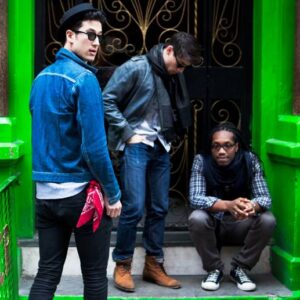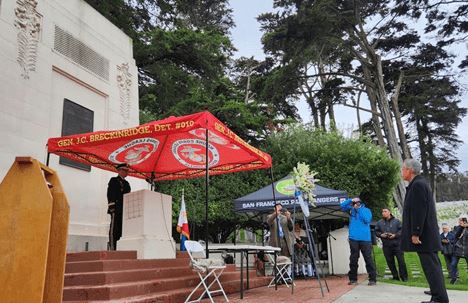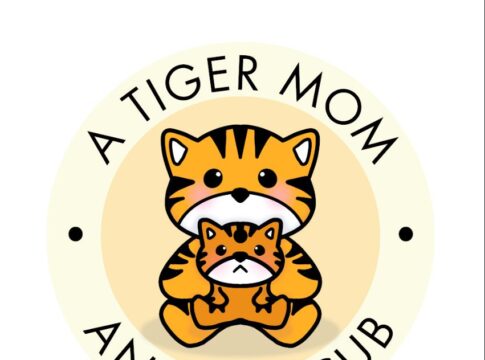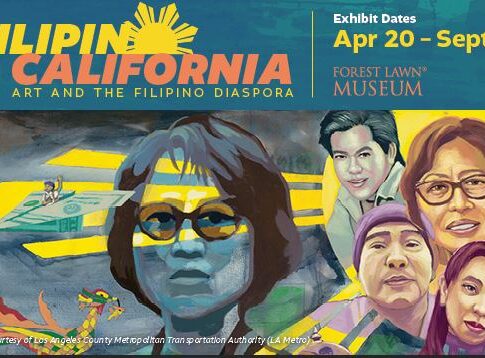By Lisa Bernier
 It is fitting that the name of the band, Andy Suzuki & The Method is both a bold declaration of identity and a humorous nod to tradition: both Asian and musical.
It is fitting that the name of the band, Andy Suzuki & The Method is both a bold declaration of identity and a humorous nod to tradition: both Asian and musical.
“It’s my name and also a play on the classical training books, the Suzuki Method,” explained frontman Andy Suzuki. “We thought it would be kinda cool, an inside joke.”
LATEST STORIES
The band has been making a name for itself on the NYC music scene, regularly booking gigs with famed performance spaces like Joe’s Pub and The Mercury Lounge. They have also been featured by NPR, Time Out New York, and made appearances on NYC Rooftop Series and Balcony TV New York. With a new album dropped, and their music video, “Born Out of Mischief” garnering over 15,000 views, the band is on verge of seriously breaking out.
This is even more remarkable in light of the fact that, in an industry determined to put labels on every act in order for marketing purposes, Andy Suzuki & The Method quietly defies all conventions when it comes to identity, whether it comes to music or race. Composed of half-Japanese, half-Jewish singer Andy Suzuki, half-Korean and half Jewish violinist Jason Gorelick and African American percussionist Kozza Babumba, this indie-pop-folk-rock band has carved out its own niche in the music industry, and is doing very well.
In an interview with both Suzuki and Gorelick, the latter recalled when they just began to booking gigs, their multi-racial musical face mattered: “For the band image and our brand I know it’s very much a part of what we’re selling because we have a great cultural face in a sea of white bands. It made a difference in the earlier days when we were booking gigs. It was a positive to have that. The industry and world…has been more interested in diversity and race than the previous decade.”
Suzuki was even more frank on the ways their identity affected their interactions with both the industry and their fan base, specifically discussing how his and Jason’s biraciality has had an unintended, positive effect. “There are a lot of people who will see an Asian singer songwriter and not be interested because they’re Asian, and that’s the troubled world we live in,” he said. “So I think that people have come across in the industry, higher up people, they look at me as potentially as “he’s not too Asian” so no one will be scared to listen to him…and is he a huge asset because there’s a cohort of Asian fans to jump on that way too—so wow, what a great thing.”
Suzuki then recalled how he initially considered a career strictly in Japan.
“Now things are really starting to pick up in the US. But before that, I had a Japanese manager, and through some random thing (he found me through You Tube) was interested and wanted to see what would happen [if he marketed me in Japan]. Now, my Japanese is good but not good enough for lyrics. I cut a Japanese demo in New York and he shopped me to labels in Japan. I went to Japan in 2010, solely because I’m half Japanese and half white. If I were full Asian, it wouldn’t have happened, and if I were full white, it wouldn’t have happened. I had a showcase, and there was interest, and I actually was thinking about moving to Japan, but I made a decision based on the fact that if I had gone that route, I would have had to ‘worn a hat,’ so to speak. When I was writing the songs we marketed to the Japanese labels, I had specific Japanese artists in mind…and it wasn’t me. So I chose to stay here [in America]. I realized if I go to Japan as an artist, I want it to be my music, that’s really me.”
Both Gorelick and Suzuki also recognize how their separate Asian heritages, Korean and Japanese, have affected their musical influences. Suzuki grew up influenced by both Japanese traditional music and Japanese pop and hip hop. Suzuki also honestly addressed how being biracial affected his overall identity, not just his creative roots:
“I remember being in 7th grade or younger, and thinking that if I pushed hard enough on my Jewish nose it would go away. I used to have a buzz cut so you couldn’t see it was mainly Jewish hair in order to look ‘more Asian’…So yeah, despite all that, and my feeling inferior and wishing I was more “Asian” looking and feeling like I wasn’t fully a part of that community (and still not feeling that), it’s been great realizing that wow, there are all these Asian people out there embracing what I’m doing, giving what I’m creating a serious listen to, not just because of our sound but because my last name is Suzuki…that makes me feel great because this is a community I grew up wanting to be a part of.”
Gorelick also talked about how he would not have started music if his Korean mother hadn’t introduced him to it.
“It’s because my mother is Korean I started learning violin at age 3. I’ve been playing since [then] and played classical music until the end of high school. I would have quit so many times when I was younger if not for my mom, and I’m thankful to still be playing today. It’s not because I’m half Korean, but because of my mother’s culture that I’m…doing what I’m doing now musically.”
As for advice to younger Asian and Asian-American musicians, both of them stress the importance of both following your passion while being realistic about the amount of work it takes–as well as dealing with the potential culture and familial pressures fledgling singer-songwriters might face.
“Don’t let society, parents and peers pressure you to where you don’t want to go,” advised Gorelick “If you have that passion you should do that. I’ve had the privilege to go for it—it’s not true for everyone—if you trust yourself and do whats right for you, you’ll find your way. [But also] don’t be a dumb kid and fight your parents needlessly, because you need them.”
Suzuki added, “ I would say the same thing that I would tell anyone of any race if they asked me that question, which is, especially when you’re young, you gotta, if you have the luxury of not having to work after school and have free time, you have to do with it what you want to do, not what other people want you to do. If that’s music, in a way that’s ‘breaking the stereotypes’ and you wanna be learning how to improvise on electric guitar and do a dirty rock and roll solo, that’s what you should do. If you want to do the most ‘stereotypically Asian’ thing, and that’s what you like and want to do, that’s what you should do…But am I at all suggesting everyone become a singer songwriter? It’s not the easiest road, which is why your parents don’t want you to do it, and it’s not guaranteed. It has led to an incredibly rich and fulfilling life for me, but it has challenges and added shittiness like, you’re basically hoping and working towards the 0.001% who are able to be financial successes, versus the guaranteed career security of say, being a doctor…But,” he finished, “at the end of the day it’s how interested are you in doing this. If the answer is I’m super interested, then you gotta go for it, especially while you’re young.”
For more information on Andy Suzuki & The Method, check out their website. You can also follow them on Twitter and Instagram, check out their videos on You Tube, or find them on Facebook.







